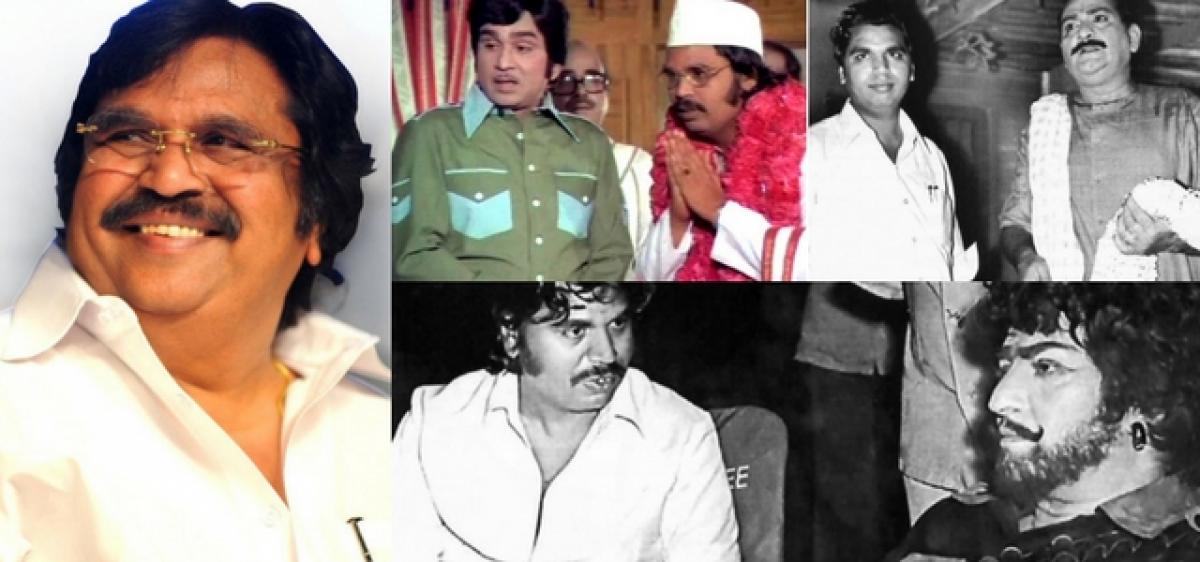Dasari A multi-faceted talent

A young man sits beside his ailing father and there are medicines on the bedside table. The father with a heavy voice says, “Orey ee mandula perlu telusa. Septramycin, Gentamycin …Terramycin. Mycin ante telusa, my sin…nenu chesina papalra avi ee mandula roopam lo ventaadutunnayi.” No sooner the dialogue was completed, the audience in the theatre gave an impromptu thunderous applause.
He was a writer, lyricist, director and producer, who championed small films. He was the man who gave glamour to the word director. Dasari Narayana Rao will be missed by Telugu people and his position as jewel among directors (Darsakaratna) will never be usurped
A young man sits beside his ailing father and there are medicines on the bedside table. The father with a heavy voice says, “Orey ee mandula perlu telusa. Septramycin, Gentamycin …Terramycin. Mycin ante telusa, my sin…nenu chesina papalra avi ee mandula roopam lo ventaadutunnayi.” No sooner the dialogue was completed, the audience in the theatre gave an impromptu thunderous applause.
The movie was ‘Devude Digivaste’ (1975), written and directed by Dasari Narayana Rao. In times when legendary Aacharya Atreya penned dialogues that struck a chord with class audience, Dasari with his contemporary dialogues came as a fresh breath, which floored the masses. GEN X calls writer-director Trivikram ‘Matala Mantrikudu’, but it was the title given to Dasari Narayana Rao, 40 years ago.
He gained fame as a dialogue writer, before wielding megaphone in 1972 with ‘Tata Manavadu’. Palakollu-born Dasari was a self-made man, who stood by what he believed was correct. In a film in which he wrote dialogues, actress Suryakantam wanted the lines “Kunti kukka pai kobbarikaya paddattu”, changed to Telugu saying “Muulige nakka pai tatikaya paddattu”. However, Dasari stood his ground and said that he would not change the lines. The shooting came to a halt for a while but later the actress mouthed the lines he wrote.
While ‘Tata Manavadu’ starring comedian Rajababu as the main lead, made audience shed tears with a poignant tale of a relationship between grandfather and grandson in the changing society, it also made industry and audience realise that a phenom called Dasari Narayana Rao arrived and he was here to stay.
He churned out movies one after another, and most of them turned out to be classics.
More than making classics, Dasari along with his compatriot Raghavendra Rao gave glamour to the profession – director. Dasari went a step ahead and had his title card above movie’s title, a trend many top directors still continue.
For the best part of the 70s and 80s, Dasari directed films that won both commercial and critical acclaim. Human relationships and its dynamics formed the core of the subject in most of the early films of Dasari. Even though he never tagged himself as a feminist, he is known for having strong and independent female characters in his films.
A dialogue writer, lyricist, producer and director, he is a multi-faceted talent, who made films not only in Telugu but also in Tamil, Kannada and Hindi. His and Akkineni Nageswara Rao is a combination that minted awards and rewards.
Their film ‘Meghasandesam’, which was released 1982 was regarded by many as Dasari’s best film. The film has lilting music and thought-proving lyrics, which even swayed the masses. It dealt with the concept of companionship and live-in relationship, which was way ahead of the time.
So was his ‘Thoorpu Padamara’ (1976), a remake of Balachander’s ‘Apoorva Raagangal’. Dasari’s penchant for human relation dynamics and hid deft touches made the audience to get engrossed with a complex story in which a father played by Satyanarayana loves a girl much younger than his son, while his son played by Narasimha Raju loves the girl’s (Madhavi) mother Sri Vidya.
While his films with Nageswara Rao were poignant tales, he directed blockbusters like ‘Bobbili Puli’ (1982), and ‘Sardar Paparayudu’ (1980) with NT Rama Rao. Legend says that Dasari penned 13-minute long dialogues for the famous courtroom climax scene in the film ‘Bobbili Puli’.
NT Rama Rao who came to the sets at 9 am and after the director explained the scene and dialogues, NTR left for Marina Beach, which was nearby and practised the dialogues. He came back to set and okayed the scene in a single take. NTR’s expressions, modulation and delivery give goose bumps every time the scene is played on the screen.
In the late 80s, Dasari canvassed for Congress party. Although he was working behind the scenes in the political front, it was for the first time he entered mainstream politics. This had a profound impact on his films, as post his political entry; he made films on political issues. It has become a norm that Dasari would come up with a political satire before every general election.
With this change, he failed to deliver the classics he gave in the 80s but films like Vijayashanti - starrer ‘Osey Ramulamma’ (1997), R Narayana Murty - starrer ‘Orey Rickshaw’ (1995) and Sharada - starrer ‘Amma Rajinama’ (1991) are a stellar success.
Apart from being an ace director, he was a vocal proponent of small cinema and fought for the rights of workers. Dasari who made mega budget films like ‘Vishwanatha Nayakudu’ (1997) with Rs 5 crore also made ‘Needa’ (1979) with a budget of Rs one lakh.
In one of his last public appearances, he called for mini theatre system to safeguard small cinema. He proposed five shows in theatres instead of current four, where the extra show should be a small film that was released in that week along with big films.
Dasari was prolific until the 90s, after he saw success as actor, the director in him took backseat. Nevertheless he wanted to make a biopic on actress and Tamil Nadu CM J Jayalalithaa and registered title ‘Amma’, but his ill health took him to Amma.

